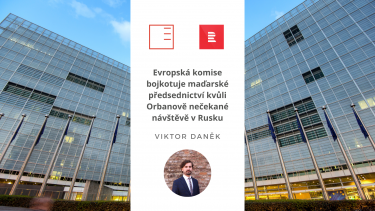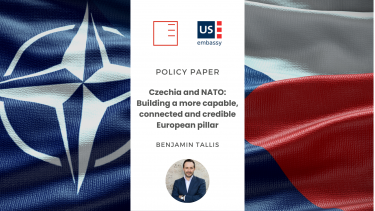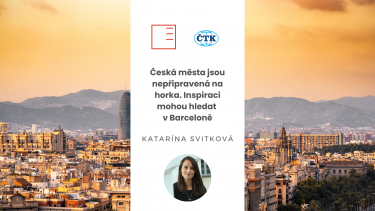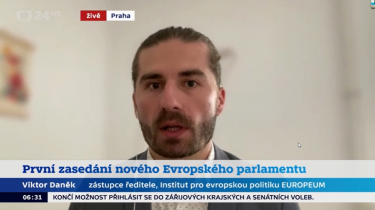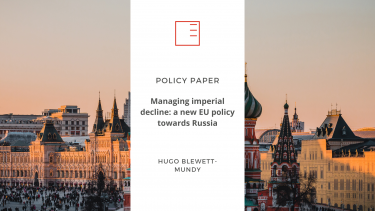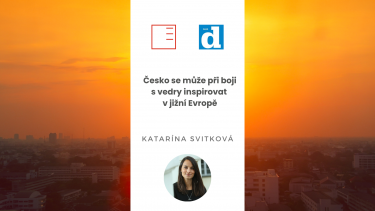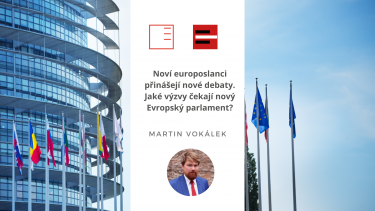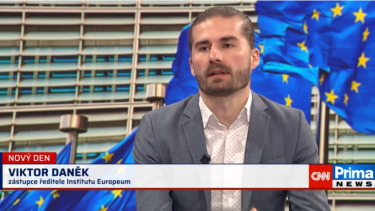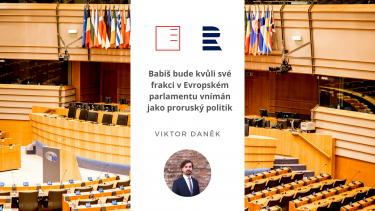ČRo | The European Commission boycotts the Hungarian presidency due to Orban's unexpected visit to Russia
The European Commission has announced that, in light of developments since the beginning of the Hungarian presidency of the Council of the European Union, it plans to boycott informal ministerial meetings and send only senior officials instead of commissioners. Viktor Orbán has come under criticism for his recent trip to Russia, which he described as a peace mission aimed at ending the war in Ukraine and which he did not consult with the leaders of other EU states. This move comments Viktor Daněk, deputy director of EUROPEUM Institute for Czech Radio.
Show morePolicy paper | Czechia and NATO: Building a more capable, connected and credible European pillar
CEE allies are key to building the capabilities-based, European Pillar NATO needs to enact genuine burden shifting and secure the alliance’s future. Dr Benjamin Tallis shows how Czechia can build on recent progress in defense procurement and increase its influence by prioritising the six elements Euro-NATO needs: core national war-fighting capabilities, logistics, military mobility, strategic enablers, air defence and long-range strategic strike.
Show moreČTK | Czech cities are unprepared for heatwaves. They can find inspiration in Barcelona
Czech cities can draw inspiration from southern Europe in combating heat, such as Barcelona, which has effective plans and is better adapted to high temperatures. For instance, the city boasts over two hundred "climate shelters" in publicly accessible spaces like museums, galleries, offices, and libraries, providing drinking water, air conditioning, and informational services. However, the Czech Republic is unprepared for heatwaves. Associate Researcher Fellow at EUROPEUM Institute Katarína Svitková commented for the Czech News Agency.
Show more
ČT24 | The first plenary session of the new European Parliament
MEPs will elect the new leadership of the European Parliament at the inaugural session in Strasbourg. Maltese MEP Roberta Metsola from the European People's Party is once again running for the position of president. On Thursday, they will also choose the head of the new European Commission, with most leaders supporting the current president, Ursula von der Leyen. Viktor Daněk, deputy director of EUROPEUM Institute, commented for ČT24.
Show morePolicy paper | Managing imperial decline: a new EU policy towards Russia
Russia's full-scale invasion of Ukraine in February 2022 has shattered the post-Cold War international order built upon East-West interdependence and cooperation. The European Union (EU) - which had tried to pursue a strategic relationship with Russia after the collapse of the Soviet Union in 1991 - must now adapt to the geopolitical reality of Russian neo-revisionism. Hugo Blewett-Mundy, an Associate Research Fellow at EUROPEUM Institute, identifies four areas where the EU's policy towards Russia could evolve to confront this emerging security situation in Europe.
Show moreDeník.cz | Czech Republic can find inspiration in southern Europe in the fight heatwaves
Czech cities could take inspiration in combating high temperatures from cities in southern Europe, such as Barcelona, which has effective plans and is well-adapted to extreme heat. Barcelona boasts over two hundred climate shelters in publicly accessible institutions like museums, galleries, offices, and libraries, providing drinking water, air conditioning, and informational services. According to Katarína Svitková, an Associate Research Fellow at EUROPEUM Institute, Czechia lacks action plans and responds to heat only at the last minute. Preparedness for tropical days is crucial for protecting the population, especially seniors and young children, for whom summer days are the most demanding.
Show more
TASR | Slovakia will have only one female MEP in the European People's Party
After the June European elections, Slovakia will have its weakest representation in the largest political group of the European Parliament - the European People's Party - since joining the EU in 2004. The only MEP in the EPP faction will be Miriam Lexmann from the Christian Democratic Movement. For the Slovak News Agency commented Žiga Faktor, head of the Brussels office and deputy director of EUROPEUM Institute.
Show more
Czech Radio | New MEPs bring new debates. What challenges await the new European Parliament?
According to the Executive Director of EUROPEUM Institute Martin Vokálek European topics will be more frequently discussed in the public sphere. The reason for this are the newly elected MEPs, who met for the first time this week at a plenary session in Strasbourg. Their ranks include not only "traditional" politicians but also prominent figures with unconventional approaches. What challenges and changes can we expect from the new European Parliament? Listen to the Czech Radio podcast Bruselské chlebíčky.
Show more
CNN Prima News | How political group work in the European Parliament?
Last week the discussions about the political groups of the European Parliament finalized. What exactly are they and what are their tasks? And what role will Czech MEPs play in them? Viktor Daněk, Deputy Director of EUROPEUM Institute answered these questions on the morning show of CNN Prima News.
Show moreCzech Radio | Babiš will be seen as a pro-Russian politician due to his faction in the European Parliament
ANO movement leader Andrej Babiš recently co-founded a new group in the European Parliament with Viktor Orbán. Patriots for Europe, considered an extreme right-wing bloc, now include parties of Marine Le Pen and Geert Wilders among others. Czech Prime Minister Petr Fiala labeled it as pro-Russian oriented. Viktor Daněk, Deputy Director of EUROPEUM Institute, commented on Babiš's actions for Czech Radio.
Show moreStaroměstské náměstí 4/1
Prague 1 - Staré Město
110 00
tel.: +420 212 246 552
email: europeum@europeum.org
https://www.europeum.org
